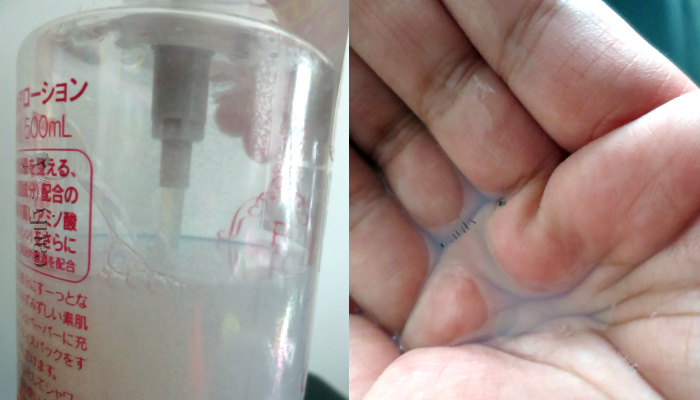
<!–
–>


Many Asian skin care brands derive their products from plant- or food-based ingredients. Thus, it’s not unusual to see honey, fruits, vegetables and dairy products proudly promoted in their packaging as one of the essential ingredients.
However, I’ve never tried anything that has an alcoholic drink as its main ingredient. While I’m now used to products that have fermented components in them like snail, honey and green tea extracts, this is my first time to use a lotion that has a heavy concentration of fermented rice liquor or sake as its primary ingredient. So let me tell you about my experience with the Kiku-Masamune Sake Skin Care Lotion (Fresh).
The Big, the Brewed and the Beautiful
This 500ml product is the equivalent of a toner, which is usually called lotions in Japan. The last time I used a toner this size, it took me nearly a year to use it all up. The watery-milky consistency of this product makes it ideal for decanting into smaller spray bottles that you can take along for everyday use or for travel. It has an Extra-Moisture version and is supposedly alcohol-free, thus more suitable for those with dry skin.
The company behind this product, the Kiku-Masamune Sake Brewing Co., Ltd., is a very famous Japanese sake brewery which has been operating since 1659, thereby giving this toner a very respectable heritage. Sake was said to be used by geisha in ancient Japan to get rid of their heavy makeup and to keep skin soft and fair. The brewery also mentions in its FAQ that drinking sake also has its beauty benefits. Perhaps I should try to actually drink it next time instead of just putting it on my face.

Source: www.kikumasamune.com
The product has a very short ingredient list:
Water, butylene glycol, rice ferment filtrate (Sake), glutamic acid, arginine, leucine, placental protein, arbutin, dipotassium glycyrrhizate, glycerin, styren / Acrylates copolymer, alcohol denat, citric acid, sodium citrate, methylparaben, propylparaben, fragrance


Everything is written in Japanese
Note that the first and third ingredients are water and sake. Others include amino acids like glutamic acid and arginine, as well as arbutin, denatured alcohol, citric acid, and parabens. I’m generally not averse to alcohol and parabens in skin care because these usually serve a purpose, such as acting as preservatives. This product claims to be free of mineral oil and artificial color, too.
If you think that this lotion will smell heavily like liquor, you might be surprised. The lotion gives off an initial bubblegum scent which always makes me want to take a sip. This is followed by a familiar yeasty, beer-like smell which dissipates very quickly. I actually find this scent more tolerable than the cloying flowery and floral fragrances that accompany other products.
Good vs. Evil Bacteria
Due to its watery texture, it’s very tempting to assume that you can just splash or spray this lotion on your face and you will instantly achieve fair, smooth skin like a geisha’s. The truth is, during the first two weeks of my trial period, I experienced one or two small breakouts near my chin which is a historical hotspot for my cystic acne. (This is why it’s very important to patch-test first!)
However, these were not really my usual cystic pimples – they remained small, and never became red or inflamed. After some days of researching on Google, I realized that my skin might be purging itself of any leftover awful gunk in my pores, hence the minor breakouts. I had experienced this before when I first started using ferment-based products. Since the Kiku Masamune Lotion uses sake which is undoubtedly more concentrated in fermented ingredients, I took it to mean that the good bacteria in the liquid was winning the battle against the bad bacteria in my skin.
Instead of using my trusty COSRX BHA Liquid to treat the breakouts, I soaked cotton pads with the lotion and applied them on the affected areas for 5 minutes several times a day. Surprisingly, doing so helps the spots heal more quickly, and because of the arbutin ingredient, the hyperpigmentation is lighter than usual.

The amount I’ve used for the past 45+ days. Only a little is needed to pat on the face.
A Refreshing Drink for Your Skin
To date, I’ve been using the Kiku Masamune Lotion for roughly 45 days. It performs well in the yo-yoing humidity and temperature levels in Hong Kong, and with the rest of my skin care products. I find that during dry days, it really goes perfectly with the Hada Labo Hyaluronic Acid Lotion. On its own, it’s absorbed much more rapidly by my skin right after cleansing.
I’m also applying it on the rest of my body and surprisingly, it’s actually good as a sort of after-shave for my legs. I get no razor bumps on my skin and my legs actually feel much smoother than usual. I seriously think this lotion can be used for many more things.
Most reviews cite the pump dispenser as the one flaw in this product and I do agree. However careful I try to be, it manages to squirt the liquid everywhere but my hands so I plan to decant it into a repurposed flip-top bottle or perhaps a smaller pump bottle.
The Kiku Masamune Sake Skin Care Lotion retails for US$23.90 for a 500ml bottle (it only comes in one size), which works out to an impossibly cheap $0.05 per milliliter. If you want an affordable, effective toner, look no further!